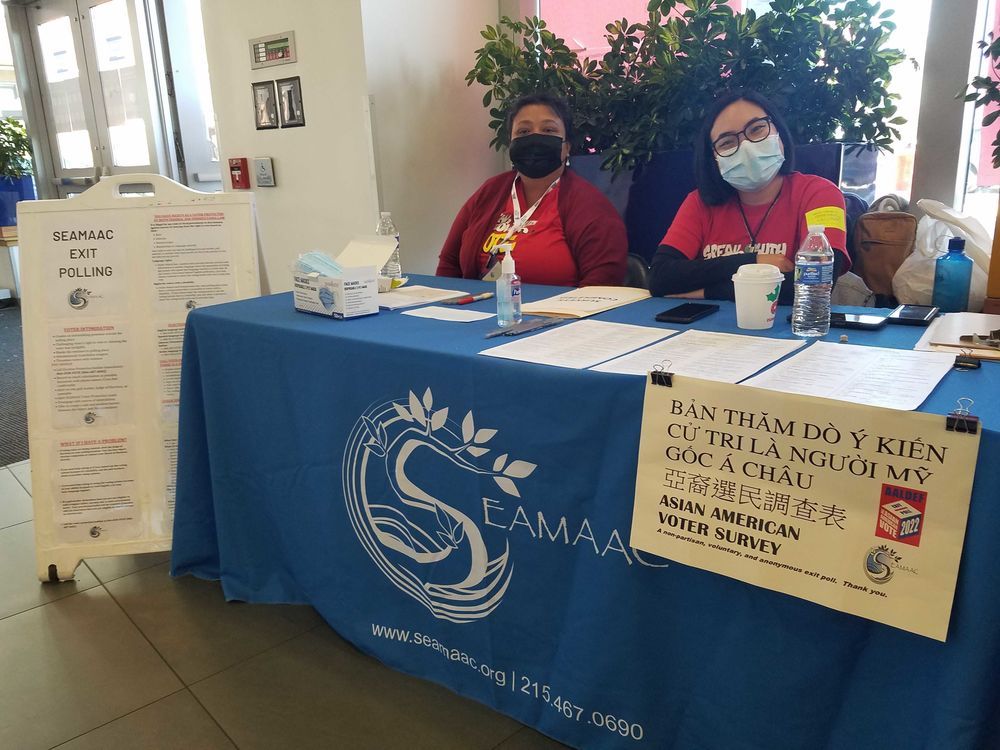News
Bloomberg: Grassroots Groups Key to Turning Out Asian American Voters

By Amy Yee/Bloomberg
Under federal law, Philadelphia offered Chinese-language help in midterm elections as community organizations worked to boost turnout of AAPI voters.
In the waning hours of US midterm elections last week, a Chinese American couple in their 70s in Philadelphia’s Chinatown voted for the third time in their lives. They were eager to do so, but Cun Jun Zheng and Shu Xiang Wang needed help to cast their ballots.
They speak limited English, so they’d been in touch with Wei Chen, 32, civic engagement director with Philadelphia nonprofit Asian Americans United (AAU). Chen is trilingual and fluent in Fujianese, the Chinese dialect the couple speak. At the voting booth, he walked them through instructions and helped them navigate the touch-screen machine, as is permitted under federal law.
Afterwards, they stood outside the Chinatown church transformed into a poll site. Voting is a “sacred” duty, said Wang, who immigrated from China. She became a US citizen in 2016 with help from AAU, which also registered her to vote. Wang cast her ballot for the first time in 2016 and urged her husband to do the same.
“For us Chinese, it is especially important to vote,” said Zheng, a retired restaurant worker who came to the US in 1986. “There’s a lot of racism in our country. We need better leaders.”
…
In the battleground state of Pennsylvania, voters ultimately helped John Fetterman flip its Senate seat to Democrats in one of the most hard-fought races in the country, and also elected Democrat Josh Shapiro as governor. It’s likely Asian American voters made a difference: Nationally, 44% think of themselves as Democratic, 19% as Republican and 29% as independent, according a survey by the advocacy group APIAVote in spring 2022. For the midterm elections in Pennsylvania, about 74% of AAPIs voted Democratic for Senate and governor, an exit poll by the Asian American Legal Defense and Education Fund found.
…
Gathering Data About AAPI Voters
In addition to organizing AAU staff and volunteers on Election Day, Chen worked as a poll monitor for the Asian American Legal Defense and Education Fund. The national civil rights group conducted the largest national exit poll of AAPI voters this year — spanning 15 states, including Pennsylvania — and monitored compliance with Section 203 in various cities. (It’s common for big exit polls not to include AAPIs, who are often lumped into the “other” category.)
Preliminary results from AALDEF’s survey showed that nationally in House races, 64% of AAPIs voted for Democrats and 32% for Republicans. And in Pennsylvania, support for Democrats in Senate and gubernatorial races was even higher at 74%. Top factors influencing their vote were the economy and jobs, health care and education. More than 21% had experienced anti-Asian harassment in the past two years, and 83% supported teaching AAPI history in schools.
AALDEF’s poll of 5,351 AAPI voters was conducted in 11 Asian languages:, including Arabic, Bengali, Chinese, Gujarati, Hindi, Khmer, Korean, Punjabi, Tagalog, Urdu and Vietnamese. Community groups like SEAMAAC and AAU also assisted people with filling out the survey outside polls.
Across the US, AALDEF found violations of Section 203, such as sites with no interpreters and other problems. In Philadelphia, there were glitches at various voting stations, such as no translators, signage or instructions in Chinese.
“Too many Asian American voters were required to provide identification when it was not required, were sent to the wrong poll site, were not given provisional ballots, and did not have access to interpreters,” said Jerry Vattamala, director of AALDEF’s Democracy Program. In Philadelphia, there were glitches at various poll sites such as no signage or instructions in Chinese.
In South Philadelphia, Mandarin speaker Vittorio Cho, 85, was a poll worker at Ford Pal Recreation Center. Cho is a US veteran who wants to “serve this country in any capacity,” he said of his work on Election Day.
…
